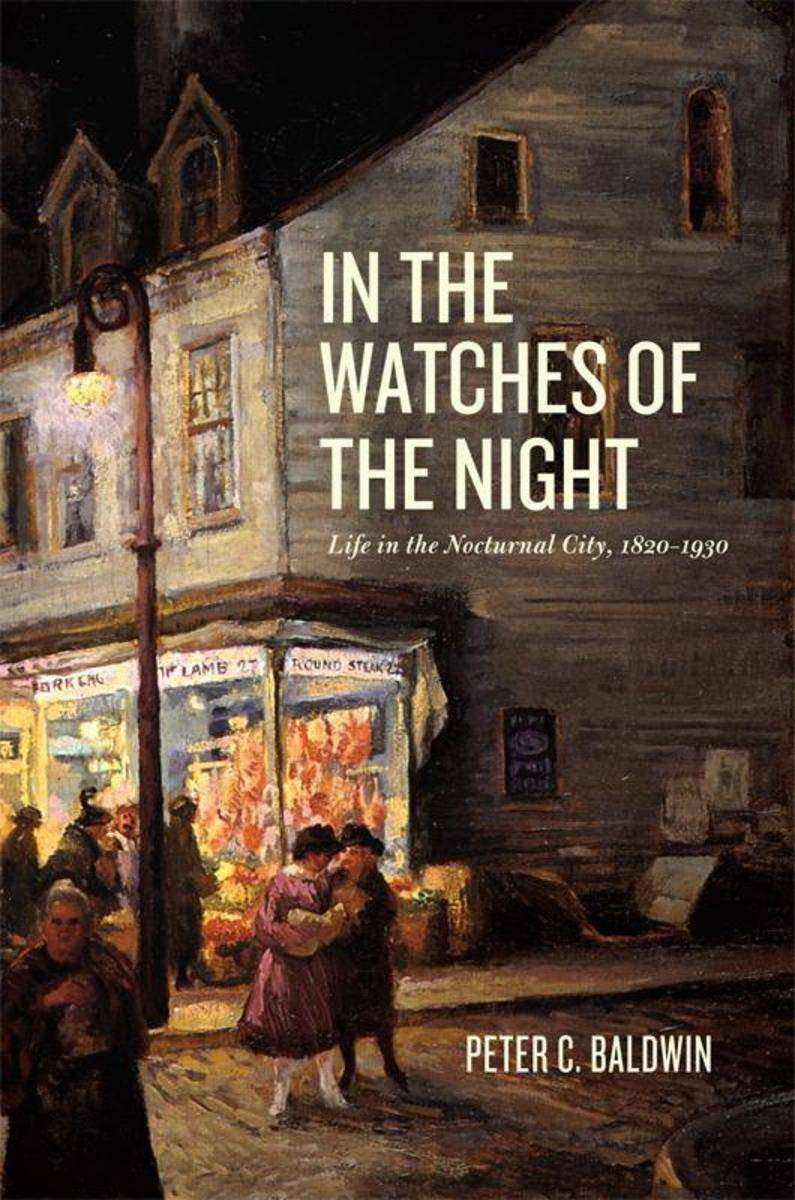
In the Watches of the Night
¥223.67
Before skyscrapers and streetlights glowed at all hours, American cities fell into inky blackness with each setting of the sun. But over the course of the nineteenth and early twentieth century, new technologies began to light up streets, sidewalks, buildings, and public spaces. Peter C. Baldwin's evocative book depicts the changing experience of the urban night over this period, visiting a host of actors-scavengers, newsboys, and mashers alike-in the nocturnal city.Baldwin examines work, crime, transportation, and leisure as he moves through the gaslight era, exploring the spread of modern police forces and the emergence of late-night entertainment, to the era of electricity, when social campaigns sought to remove women and children from public areas at night. While many people celebrated the transition from darkness to light as the arrival of twenty-four hours of daytime, Baldwin shows that certain social patterns remained, including the danger of street crime and the skewed gender profile of night work. Sweeping us from concert halls and brothels to streetcars and industrial forges, In the Watches of the Night is an illuminating study of a vital era in American urban history.

Fragments and Assemblages
¥223.67
In Fragments and Assemblages, Arthur Bahr expands the ways in which we interpret medieval manu*s, examining the formal characteristics of both physical manu*s and literary works. Specifically, Bahr argues that manu* compilations from fourteenth-century London reward interpretation as both assemblages and fragments: as meaningfully constructed objects whose forms and textual contents shed light on the city's literary, social, and political cultures, but also as artifacts whose physical fragmentation invites forms of literary criticism that were unintended by their medieval makers. Such compilations are not simply repositories of data to be used for the reconstruction of the distant past; their physical forms reward literary and aesthetic analysis in their own right. The compilations analyzed reflect the full vibrancy of fourteenth-century London's literary cultures: the multilingual codices of Edwardian civil servant Andrew Horn and Ricardian poet John Gower, the famous Auchinleck manu* of texts in Middle English, and Chaucer's Canterbury Tales. By reading these compilations as both formal shapes and historical occurrences, Bahr uncovers neglected literary histories specific to the time and place of their production. The book offers a less empiricist way of interpreting the relationship between textual and physical form that will be of interest to a wide range of literary critics and manu* scholars.
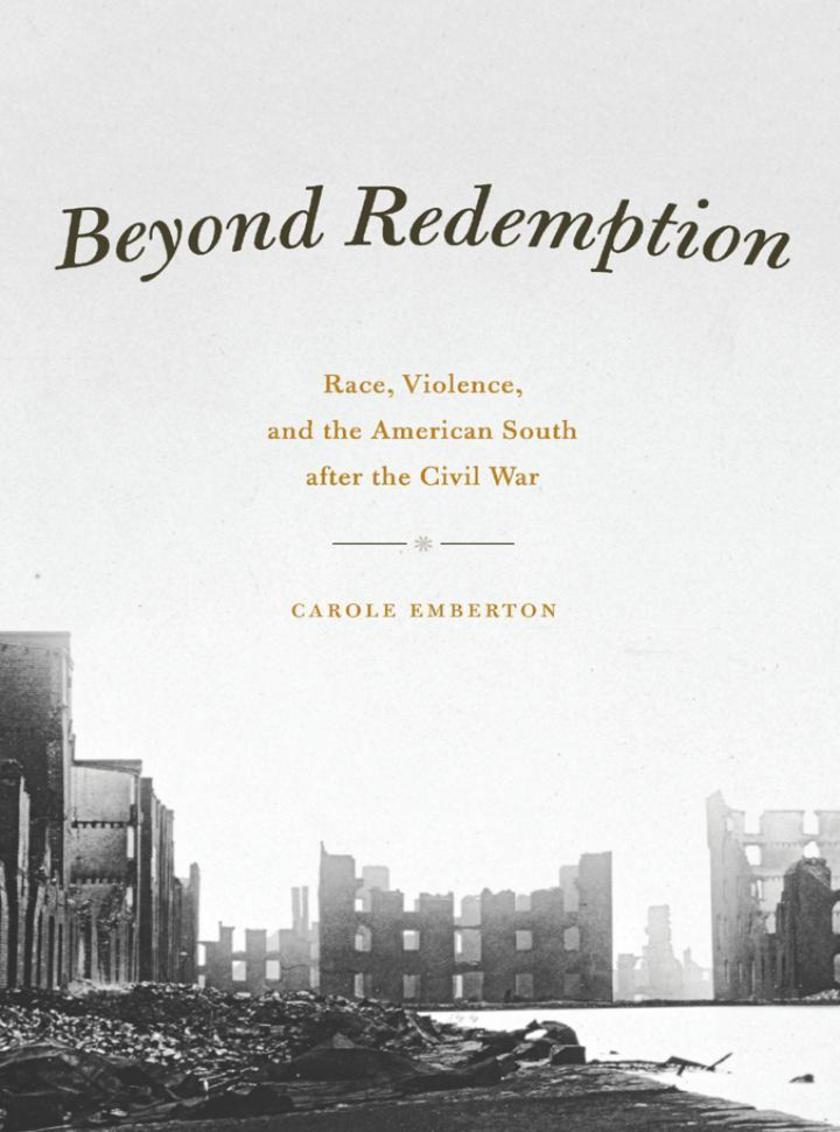
Beyond Redemption
¥223.67
In the months after the end of the Civil War, there was one word on everyone's lips: redemption. From the fiery language of Radical Republicans calling for a reconstruction of the former Confederacy to the petitions of those individuals who had worked the land as slaves to the white supremacists who would bring an end to Reconstruction in the late 1870s, this crucial concept informed the ways in which many people-both black and white, northerner and southerner-imagined the transformation of the American South.Beyond Redemption explores how the violence of a protracted civil war shaped the meaning of freedom and citizenship in the new South. Here, Carole Emberton traces the competing meanings that redemption held for Americans as they tried to come to terms with the war and the changing social landscape. While some imagined redemption from the brutality of slavery and war, others-like the infamous Ku Klux Klan-sought political and racial redemption for their losses through violence. Beyond Redemption merges studies of race and American manhood with an analysis of post-Civil War American politics to offer unconventional and challenging insight into the violence of Reconstruction.
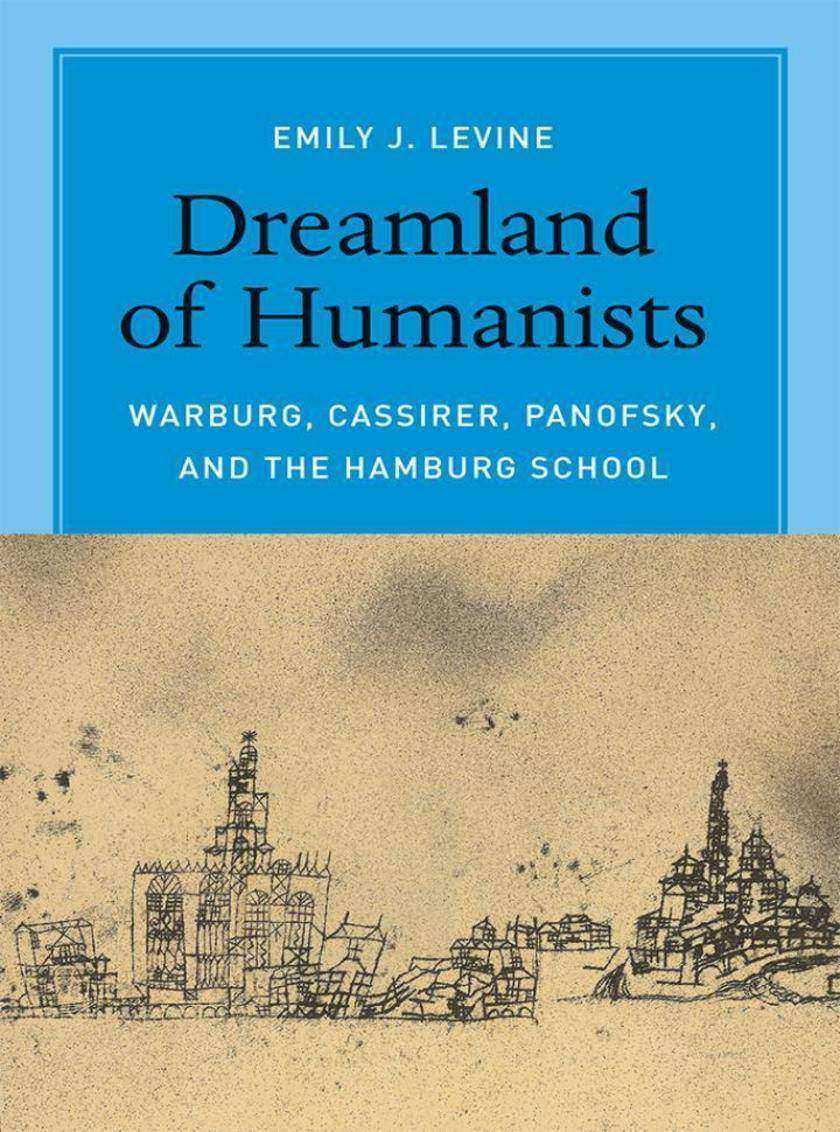
Dreamland of Humanists
¥223.67
Deemed by Heinrich Heine a city of merchants where poets go to die, Hamburg was an improbable setting for a major intellectual movement. Yet it was there, at the end of World War I, at a new university in this commercial center, that a trio of twentieth-century pioneers in the humanities emerged. Working side by side, Aby Warburg, Ernst Cassirer, and Erwin Panofsky developed new avenues in art history, cultural history, and philosophy, changing the course of cultural and intellectual history in Weimar Germany and throughout the world.In Dreamland of Humanists, Emily J. Levine considers not just these men, but the historical significance of the time and place where their ideas took form. Shedding light on the origins of their work on the Renaissance and the Enlightenment, Levine clarifies the social, political, and economic pressures faced by German-Jewish scholars on the periphery of Germany's intellectual world. By examining the role that context plays in our analysis of ideas, Levine confirms that great ideas-like great intellectuals-must come from somewhere.?

Not Without Honor
¥223.57
Not Without Honor threads together the stories of three American POWs-Carano; his buddy Bill Blackmon, who was also at Stalag 17 b; and John C. Bitzer, who survived the brutal "e;Death March"e; from northern Germany to liberation in April 1945. At times the journal reads like a thriller as he records air battles and escape attempts. Yet in their most gripping accounts, these POWs ruminate on psychological survival. The sense of community they formed was instrumental to their endurance. This compelling book allows the reader to journey with these young men as they bore firsthand witness to the best and worst of human nature.

Long Is the Way and Hard
¥223.57
Celebrating its one-hundredth anniversary in February 2009, the National Association for the Advancement of Colored People (NAACP) has been the leading and best-known African American civil rights organization in the United States. It has played a major, and at times decisive, role in most of the important developments in the twentieth century civil rights struggle. Drawing on original and previously unpublished scholarship from leading researchers in the United States, Britain, and Europe, this important collection of sixteen original essays offers new and invaluable insights into the work and achievements of the association. The first part of the book offers challenging reappraisals of two of the NAACP's best-known national spokespersons, Walter White and Roy Wilkins. Other essays analyze the association's cultural initiatives and the key role played by its public-relations campaigns in the mid 1950s to counter segregationist propaganda and win over the hearts and minds of American public opinion in the wake of the NAACP's landmark legal victory in Brown v. Board of Education. Others provide thought-provoking accounts of the association's complex and difficult relationship with Martin Luther King, the post-World War II Civil Rights movement, and Black Power radicals of the 1960s. The second part of the collection focuses on the work of the NAACP at state, city, and local levels, examining its grassroots organization throughout the nation from Chicago, Cleveland, and Detroit in the North, to California in the West, as well as states across the South including Virginia, Arkansas, Alabama, Louisiana, and Texas. Providing detailed and fascinating information on hitherto little explored aspects of the association's work, these studies complement the previous essays by demonstrating the impact national initiatives had on local activists and analyzing the often-strained relations between the NAACP national office in New York and its regional branches.

Funny! - Twenty-Five Years of Laughter from the Pixar Story Room
¥223.57
From Toy Story to The Good Dinosaur, some of the most iconic and hilarious moments in Pixar's films were first conceived by the artists featured in this book. But there are hundreds of gags that don't make it past the cutting room floor, like Frozone cooling some beers with his breath and Sadness wearing mom jeans. Funny! explores this material in depth, showcasing classic moments from all of Pixar's films to date, plus never-before-published illustrations and doodles from the Pixar archives. With an introduction by veteran story man Jason Katz, this book is a must-have for any Pixar fan.Copyright 2015 Disney Enterprises, Inc. All rights reserved.

Swift 3 New Features
¥222.81
A fast-paced guide to get you up and running with Swift 3 and its new featuresAbout This Book·Get up to date with the latest changes to Swift 3·Make your life easier by knowing how to port your Swift code to the latest version·Learn how to write programs that work on most of the major platforms such as iOS and LinuxWho This Book Is ForThe book is for those who are familiar with Swift but are in need of clear guidance on what's changed in the latest version and the new features.What You Will Learn·Migrate a Swift 2.2 project to Swift 3·Understand the workings of Swift Package Manager·Interact with Cocoa libraries when importing Objective C to Swift·Explore the function and operator changes new in Swift 3·Work with the advanced type changes, attribute improvements, and floating point type improvements in Swift·Discover the changes in the Swift API and see how Objective-C can be manipulated in the current API·Implement the new features central to Swift Testing and understand the new debug features·Create server-side applications using Swift 3In DetailSince Swift was introduced by Apple in WWDC 2015, it has gone on to become one of the most beloved languages to develop iOS applications with. In the new version, the Swift team aimed to take its adoption to the next level by making it available for new platforms and audiences.This book will very quickly get you up to speed and productive with Swift 3. You will begin by understanding the process of submitting new feature requests for future versions of Swift. Swift 3 allows you to develop and run your applications on a Linux machine. Using this feature, you will write your first Linux application using the debugger in Linux. Using Swift migrator, you will initiate a conversion from Swift 2.2 to Swift 3.Further on, you will learn how to interact with Cocoa libraries when importing Objective C to Swift. You will explore the function and operator changes new to Swift 3, followed by Collection and Closure changes. You will also see the changes in Swift 3 that allow you write tests easier with XCTest and debug your running code better with new formats as well. Finally, you will have a running server written completely in Swift on a Linux box.By the end of the book, you will know everything you need to know to dive into Swift 3 and build successful projects.Style and approachThe book takes a tutorial-based approach offering an overview of the new features introduced in the latest version of Swift. It includes relevant examples of how code and concepts change when it comes to working on Swift 3 compared to previous versions.
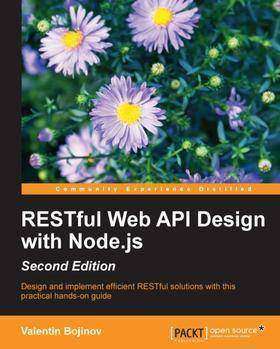
RESTful Web API Design with Node.js - Second Edition
¥222.81
Design and implement efficient RESTful solutions with this practical hands-on guideAbout This Book·Create a fully featured RESTful API solution from scratch.·Learn how to leverage Node.JS, Express, MongoDB and NoSQL datastores to give an extra edge to your REST API design.·Use this practical guide to integrate MongoDB in your Node.js application.Who This Book Is ForThe ideal target audience for this book is web developers who have some experience with RESTful services. Familiarity with basic JavaScript programming techniques is required. No prior experience with Node.JS or Express.js is required.What You Will Learn·Install, develop, and test your own Node.js user modules·Comprehend the differences between an HTTP and a RESTful application·Optimize RESTful service URI routing with best practices·Eliminate third-party dependencies in your tests with mocking·Learn about NoSQL data stores and integrate MongoDB in your Node.js application with Mongoose·Secure your services with NoSQL database integration within Node.js applications·Enrich your development skills to create scalable, server-side, RESTful applications based on the Node.js platformIn DetailIn this era of cloud computing, every data provisioning solution is built in a scalable and fail-safe way. Thus, when building RESTful services, the right choice for the underlying platform is vital. Node.js, with its asynchronous, event-driven architecture, is exactly the right choice to build RESTful APIs.This book will help you enrich your development skills to create scalable, server-side, RESTful applications based on the Node.js platform.Starting with the fundamentals of REST, you will understand why RESTful web services are better data provisioning solution than other technologies. You will start setting up a development environment by installing Node.js, Express.js, and other modules. Next, you will write a simple HTTP request handler and create and test Node.js modules using automated tests and mock objects. You will then have to choose the most appropriate data storage type, having options between a key/value or document data store, and also you will implement automated tests for it. This module will evolve chapter by chapter until it turns into a full-fledged and secure Restful service.Style and approachCreate state of the art RESTful API solutions leveraging Node.JS 4.x.
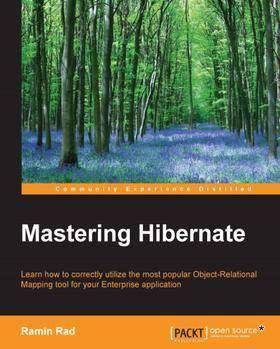
Mastering Hibernate
¥222.81
Learn how to correctly utilize the most popular Object-Relational Mapping tool for your Enterprise applicationAbout This Book·Understand the internals of Hibernate and its architecture, and how it manages Entities, Events, Versioning, Filters, and Cache·Observe how Hibernate bridges the gap between object-oriented concepts and relational models·Discover how Hibernate can address architectural concerns such as Transaction, Database Multi-tenancy, Clustering, and Database ShardsWho This Book Is ForMastering Hibernate is intended for those who are already using or considering using Hibernate as the solution to address the problem of Object Relational Mapping. If you are already using Hibernate, this book will help you understand the internals and become a power user of Hibernate.What You Will Learn·Understand the internals of a Hibernate session and how Entities are managed·Declare better mapping between entity classes and database tables·Manage entity associations and collections·Fetch data not just by entity ID, but also using HQL, Criteria Objects, Filters, and Native SQL·Observe the first and second level caches and find out how to manage them·Collect statistics and metrics data for further observation·Make your application work with multi-tenant databasesIn DetailHibernate has been so successful since its inception that it even influenced the Java Enterprise Edition specification in that the Java Persistence API was dramatically changed to do it the Hibernate way. Hibernate is the tool that solves the complex problem of Object Relational Mapping. It can be used in both Java Enterprise applications as well as .Net applications. Additionally, it can be used for both SQL and NoSQL data stores.Some developers learn the basics of Hibernate and hit the ground quickly. But when demands go beyond the basics, they take a reactive approach instead of learning the fundamentals and core concepts. However, the secret to success for any good developer is knowing and understanding the tools at your disposal. It's time to learn about your tool to use it betterThis book first explores the internals of Hibernate by discussing what occurs inside a Hibernate session and how Entities are managed. Then, we cover core topics such as mapping, querying, caching, and we demonstrate how to use a wide range of very useful annotations.Additionally, you will learn how to create event listeners or interceptors utilizing the improved architecture in the latest version of Hibernate.Style and approachThis book takes a close look at the core topics, and helps you understand the complex topics by showing you examples and giving you in-depth discussions.

React 16 Essentials - Second Edition
¥222.81
Everything you need to start working with React 16 and assess React FiberAbout This Book·Hands-on examples and tutorials for the latest React 16 release·Assess the impact of React Fiber for your future web development·Build maintainable and high performance React 16 web applicationsWho This Book Is ForIf you're a frontend developer with some knowledge of native JavaScript development and frontend frameworks, wishing to learn the fastest web user interface library there is, then this book is ideal for you.What You Will Learn·Learn to code React 16 with hands-on examples and clear tutorials·Install powerful React 16 tools to make development much more efficient·Understand the impact of React Fiber today and the future of your web development·Utilize the Redux application architecture with your React components·Create React 16 elements with properties and children·Get started with stateless and stateful React components·Use JSX to speed up your React 16 development process·Add reactivity to your React 16 components with lifecycle methods·Test your React 16 components with the Jest test frameworkIn DetailReact 16 Essentials, Second Edition, fully updated for React 16, takes you on a fast-paced journey through building your own maintainable React 16 applications. React experts Artemij Fedosejev and Adam Boduch give you all the essentials you need to know and start working with React 16, in this new edition of the best-selling React.js Essentials title. You'll find the latest React 16 code updates, assessment of React Fiber, new coverage of Redux, and how to work as a modern React developer.The authors offer you their current assessment of React Fiber, and you'll soon be exploring React 16 hands on, creating your own single and multiple user interface elements with React 16. You'll then see how to create stateless and stateful components and make them reactive. You'll also learn to interact between your components and lifecycle methods, and gauge how to effectively integrate your user interface components with other JavaScript libraries. Delve deep into the core elements of the Redux architecture and learn how to manage your application and data persistence. Then go the extra mile with the Jest test framework, and run multiple tests on your applications and find solutions to scale without complexity.Today React is used by Facebook, Instagram, Khan Academy, and Imperial College London, to name a few. Many new users recognize the benefits of React and adopt it in their own projects, forming a fast-growing community. The speed at which React has evolved promises a bright future for anyone who invests in learning it today. Let Artemij and Adam bring you a brand new look at React 16 and React Fiber, and move your web development into the future.Style and approachReact 16 Essentials, Second Edition, will take you on a fast-paced, hands-on journey through building your own maintainable React 16 applications.

R Data Visualization Recipes
¥222.81
Translate your data into info-graphics using popular packages in R About This Book Use R's popular packages—such as ggplot2, ggvis, ggforce, and more—to create custom, interactive visualization solutions. Create, design, and build interactive dashboards using Shiny A highly practical guide to help you get to grips with the basics of data visualization techniques, and how you can implement them using R Who This Book Is For If you are looking to create custom data visualization solutions using the R programming language and are stuck somewhere in the process, this book will come to your rescue. Prior exposure to packages such as ggplot2 would be useful but not necessary. However, some R programming knowledge is required. What You Will Learn Get to know various data visualization libraries available in R to represent data Generate elegant codes to craft graphics using ggplot2, ggvis and plotly Add elements, text, animation, and colors to your plot to make sense of data Deepen your knowledge by adding bar-charts, scatterplots, and time series plots using ggplot2 Build interactive dashboards using Shiny. Color specific map regions based on the values of a variable in your data frame Create high-quality journal-publishable scatterplots Create and design various three-dimensional and multivariate plots In Detail R is an open source language for data analysis and graphics that allows users to load various packages for effective and better data interpretation. Its popularity has soared in recent years because of its powerful capabilities when it comes to turning different kinds of data into intuitive visualization solutions. This book is an update to our earlier R data visualization cookbook with 100 percent fresh content and covering all the cutting edge R data visualization tools. This book is packed with practical recipes, designed to provide you with all the guidance needed to get to grips with data visualization using R. It starts off with the basics of ggplot2, ggvis, and plotly visualization packages, along with an introduction to creating maps and customizing them, before progressively taking you through various ggplot2 extensions, such as ggforce, ggrepel, and gganimate. Using real-world datasets, you will analyze and visualize your data as histograms, bar graphs, and scatterplots, and customize your plots with various themes and coloring options. The book also covers advanced visualization aspects such as creating interactive dashboards using Shiny By the end of the book, you will be equipped with key techniques to create impressive data visualizations with professional efficiency and precision. Style and approach This book is packed with practical recipes, designed to provide you with all the guidance needed to get to grips with data visualization with R. You will learn to leverage the power of R and ggplot2 to create highly customizable data visualizations of varying complexities. The readers will then learn how to create, design, and build interactive dashboards using Shiny.

Practical Data Wrangling
¥222.81
Turn your noisy data into relevant, insight-ready information by leveraging the data wrangling techniques in Python and RAbout This Book·This easy-to-follow guide takes you through every step of the data wrangling process in the best possible way·Work with different types of datasets, and reshape the layout of your data to make it easier for analysis·Get simple examples and real-life data wrangling solutions for data pre-processingWho This Book Is ForIf you are a data scientist, data analyst, or a statistician who wants to learn how to wrangle your data for analysis in the best possible manner, this book is for you. As this book covers both R and Python, some understanding of them will be beneficial.What You Will Learn·Read a csv file into python and R, and print out some statistics on the data·Gain knowledge of the data formats and programming structures involved in retrieving API data·Make effective use of regular expressions in the data wrangling process·Explore the tools and packages available to prepare numerical data for analysis·Find out how to have better control over manipulating the structure of the data·Create a dexterity to programmatically read, audit, correct, and shape data·Write and complete programs to take in, format, and output data setsIn DetailAround 80% of time in data analysis is spent on cleaning and preparing data for analysis. This is, however, an important task, and is a prerequisite to the rest of the data analysis workflow, including visualization, analysis and reporting. Python and R are considered a popular choice of tool for data analysis, and have packages that can be best used to manipulate different kinds of data, as per your requirements. This book will show you the different data wrangling techniques, and how you can leverage the power of Python and R packages to implement them.You'll start by understanding the data wrangling process and get a solid foundation to work with different types of data. You'll work with different data structures and acquire and parse data from various locations. You'll also see how to reshape the layout of data and manipulate, summarize, and join data sets. Finally, we conclude with a quick primer on accessing and processing data from databases, conducting data exploration, and storing and retrieving data quickly using databases.The book includes practical examples on each of these points using simple and real-world data sets to give you an easier understanding. By the end of the book, you'll have a thorough understanding of all the data wrangling concepts and how to implement them in the best possible way.Style and approachThis is a practical book on data wrangling designed to give you an insight into the practical application of data wrangling. It takes you through complex concepts and tasks in an accessible way, featuring information on a wide range of data wrangling techniques with Python and R
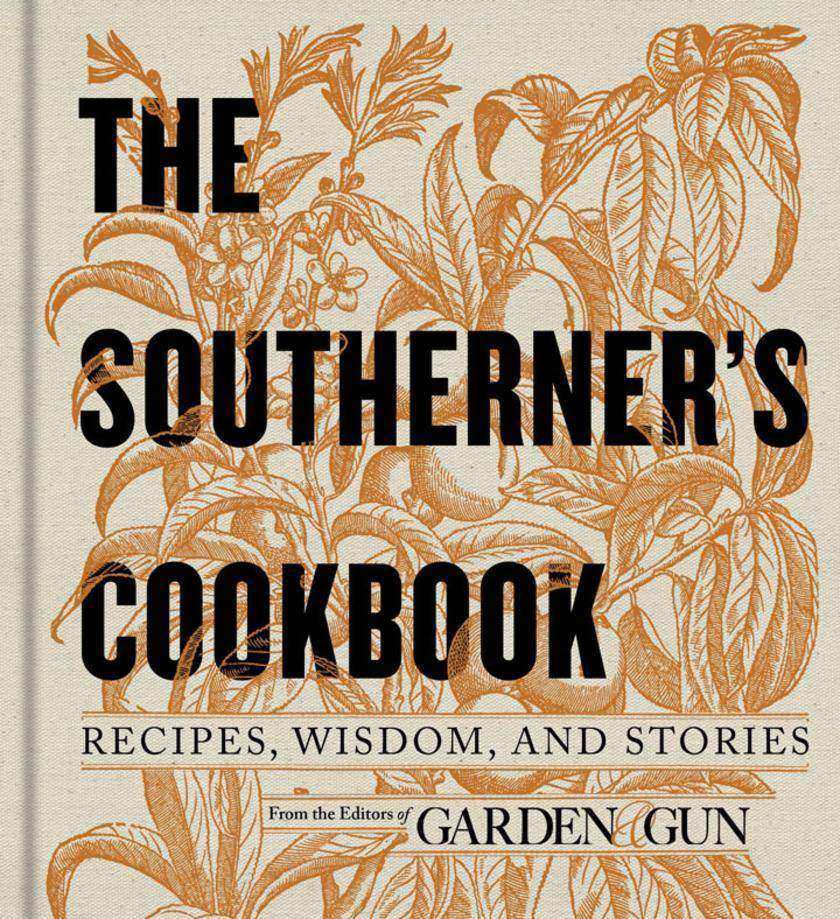
The Southerner's Cookbook
¥221.54
From the editors of Garden & Gun, the award-winning magazine that celebrates the best of Southern culture, comes this comprehensive volume of recipes, traditions, tales, and techniques that will immerse you in the South's culinary past, present, and future. With more than 125 detailed and delicious recipes both classic and modern, this beautifully photographed cookbook covers every angle of home cooking, whether you're feeding your family or entertaining a crowd. From roasting a whole hog to throwing a Lowcountry boil, the secrets of light-as-a-feather biscuits to perfectly crispy fried chicken, the art of spicing a Bloody Mary to mixing a potent punch, The Southerner's Cookbook is much more than a collection of recipes—it is a true reflection of the South's culinary landscape.
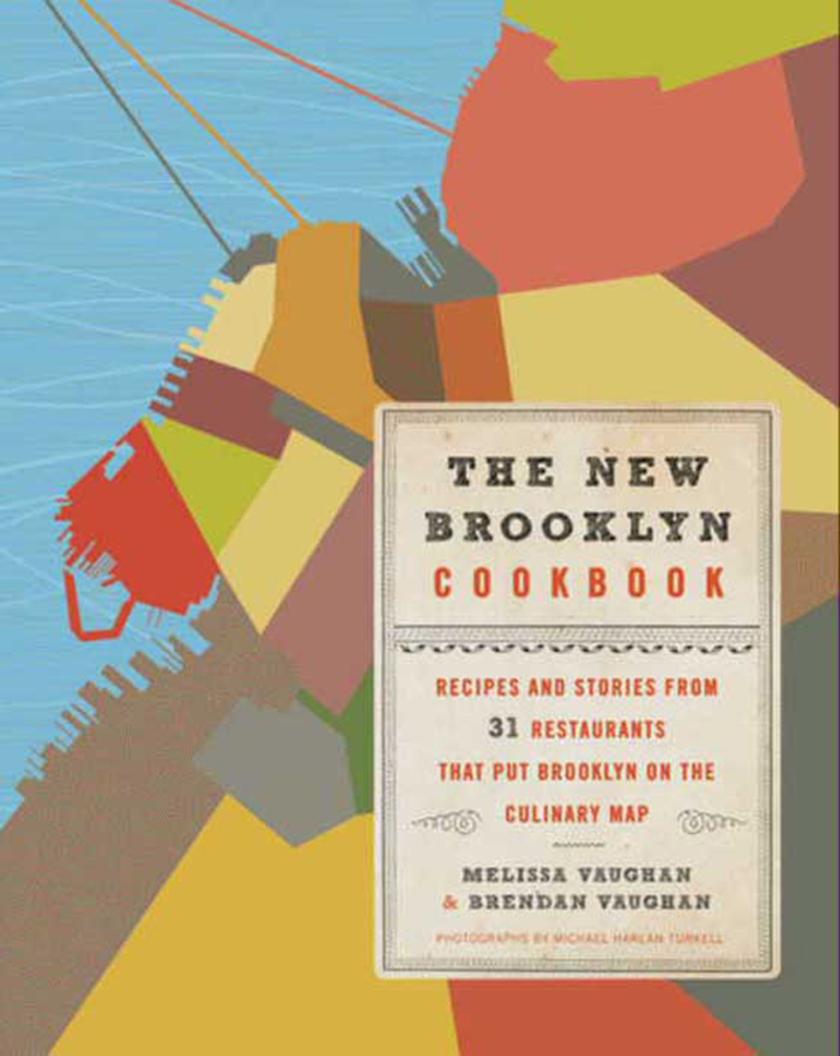
The New Brooklyn Cookbook
¥221.54
Filled with mouthwatering recipes, beautiful photographs, and scenes from some of the most vibrant restaurants in America today, The New Brooklyn Cookbook celebrates the wave of culinary energy that has transformed this thriving borough and infused its kitchens and dining rooms with passion, vigor, and big flavors. Starring the trail-blazing chefs and entrepreneurs who made it all happen, this gorgeous book helps readers recreate the signature dishes of Brooklyn in the comfort of their own kitchens.With enthusiasm and insight, husband-and-wife duo Melissa and Brendan Vaughan highlight the "new" tastes of Brooklyn, including:Steak and Eggs Korean Style (The Good Fork) Cast-Iron Chicken with Caramelized Shallots and Sherry Pan Sauce (Vinegar Hill House) Seared Swordfish with Sautéed Grape Tomatoes, Fresh Corn and Kohlrabi Salad, and Avocado Aioli (Rose Water) Beef Sauerbraten with Red Cabbage and Pretzel Dumplings (Prime Meats) Doug's Pecan Pie Sundae (Buttermilk Channel) Hoppy American Brown Ale—Home Brew Version (Sixpoint Craft Ales brewery)The Vaughans also profile some of Brooklyn's best food makers and purveyors, from cheesemakers and picklers to chocolatiers and bakers, giving readers an inside look at the ingredients behind their favorite restaurant dishes and the food culture that supports their creation.Featured Restaurants:Al Di Là The Grocery Saul Rose WaterConvivium Osteria Locanda Vini e Olii DuMontAliseo Osteria del BorgoMarlow & SonsFranny’s iCi Applewood EggNortheast Kingdom The Good Fork DresslerThe Farm on Adderley Flatbush FarmPalo Santo Lunetta Beer Table JamesThe General Greene Five Leaves Char No. 4No. 7 Buttermilk Channel Roberta’sVinegar Hill HousePrime MeatsThe VanderbiltPlus: Interviews with Ten of Brooklyn's most popular artisanal food producers

Living Raw Food
¥221.54
Picking up where the bestselling Raw Food/Real World left off, Sarma Melngailis invites us inside her glamorous restaurant, Pure Food and Wine, with dozens more recipes for fresh and vibrant juices, shakes, soups, simple dishes, main courses, desserts, and cocktails. Whip up an antioxidant-rich Goji Tropic Shake or a sweet, cleansing Cilantro-Pineapple Shake for delicious nutrition on the goCool down with a Cucumber-Mint Gazpacho Soup and an Heirloom Tomato, Fennel, and Avocado Pressed Salad with Caper Dressing, Pistachio, and MintFind out what makes the Chanterelle and Kalamata Olive Ravioli the restaurant's most beloved entrée Celebrate with a raw Thanksgiving dinner, complete with "dark meat" portobello, "white meat" large oyster mushrooms, stuffing, mashed celeriac, cranberries, and brussels sproutsSatisfy your sweet tooth with a Classic Sundae and Caramel Bars No juicerNo dehydratorNo problem! Sarma shows that raw food preparation doesn't have to be daunting, and she helps you work your way from the fastest, simplest, freshest recipes to immensely satisfying main dishes that you'll have a hard time believing are raw. A definitive list of ingredients, tools, techniques, and sources make raw food a snap, while information-packed sidebars introduce the world's most powerful super?foods, from kombucha tea to chia seeds. And Sarma is refreshingly honest and real as she describes her personal breakthroughs—and struggles—living on raw foods.Whether you're snacking on the run, having a quiet dinner at home, or throwing a festive cocktail party, eating raw food makes you feel alive. Filled with sensuous, sexy, and energizing food, this book is sure to enrich your life, whether you're a carnivorous epicure or a raw-foods junkie.

Five Frogs on a Log
¥221.54
A riddle: Five frogs are sitting on a log. Four decide to jump off. How many are leftAnswer: Five WhyBecause there's a difference between deciding and doing. Written by Mark L. Feldman and Michael F. Spratt of PricewaterhouseCoopers, Five Frogs on a Log offers readers an entertaining and no-nonsense field guide to the mergers and acquisitions jungle, packed with insight and instruction for executing corporate change and capturing shareholder value. Whether you're buying another company or acquiring a new vision of the future, this book proffers an unconventional perspective and a practical, readily accessible set of solutions to the single greatest challenge facing today's managers: executing rapid transitions ion mergers, acquisitions and gut wrenching change. Designed for corporate managers and CEOs caught up in the whirlwind of change, every chapter provides accessible ideas and wisdom for navigating the most demanding business transitions. The authors offer a unique hands-on perspective based on their work with top Fortune 500 firms. As they state: "Increasingly, the companies that win are those that learn faster, act quicker and adapt sooner. They will compress time by making and executing early, informed decisions about economic value creation, ruthless prioritization and focused resource allocation. They will use these decisions to take early firm stands on management deployment, organization structure and culture. Their actions will increasingly be linked to long-term, sustained economic value creation." The advice and expertise offered in this book can be used to solve a range of operational problems from speeding up new product development to merging two businesses; from changing company culture to repositioning a business in a while new marketplace. Whatever the challenges and opportunities facing you, your company, your industry, Five Frogs on a Log will move you from deciding to doing.

The Wizard of Oz
¥221.54
Commemorating the seventy-fifth anniversary of The Wizard of Oz, this collectible edition delivers an interactive experience, transporting readers over the rainbow and into the Land of Oz with its host of unpublished artwork, behind-the-scenes stories from the stars, and removable special features.Open the door to the Land of Oz and travel down the Yellow Brick Road with Dorothy and her companions on the journey of a lifetime. Learn the filmmaking tricks and techniques behind the film's realistic tornado, why Dorothy's shoes were ruby-colored, and how the filmmakers got a fleet of Winged Monkeys to fly. Authors Jay Scarfone and William Stillman reveal filmmaking secrets and information on everything from the film's pre- and postproduction to early reviews and publicity to never-before-published stories from the cast and crew, making it the definitive book on the subject. Beautifully designed with an array of film stills, Technicolor? test frames, rare artwork and photography, and costume and set illustrations, this collectible edition provides an unrivaled glimpse at the land where dreams come true.

Titian
¥221.49
Born in the mountains above Venice in the late fifteenth century, Tiziano Vecellio or Titian was the greatest painter of the Venetian High Renaissance. A poetic visionary and a technical master of oils, he painted everything, from frescoes and grand altarpieces to mythological stories and portraits works described by his contemporaries as "mirrors of nature."Sheila Hale's rich biography is the first since 1877 to examine all contemporary accounts of Titian's life and work as well as recent art historical scholarship, some of it previously unpublished. Her book charts the extraordinary transformation of Titian's style: from the radiant, minutely realized masterpieces of his youth, to the more freely painted work of his middle years, to the dark, tragic, sometimes terrifying visions of his old age. Drawing on the latest scientific examinations of his paintings, Hale seeks to explain the evolution of his methods and his art. In doing so, she also gives many different voices from Titian's lifetime to today free reign to explore, praise, and sometimes doubt his genius.When Titian died in 1576, in his late eighties, he had spent the whole of his working life in Venice the most celebrated city in Europe traveling as little as possible despite the clamor for his presence at the great courts of the continent. He had witnessed wars, Ottoman invasions, and the rising Protestant threat to the Catholic Church. He had become the favored painter of both Charles V the most powerful man in the world and his son, Philip II of Spain, who became Titian's most important patron.Sheila Hale's masterly biography presents Titian through the lens of the turbulent times in which he lived and explores how this innovative sixteenth-century master conveyed in his paintings a kind of truth that few other artists have been able to communicate, which has fascinated Titian's admirers and followers ever since.
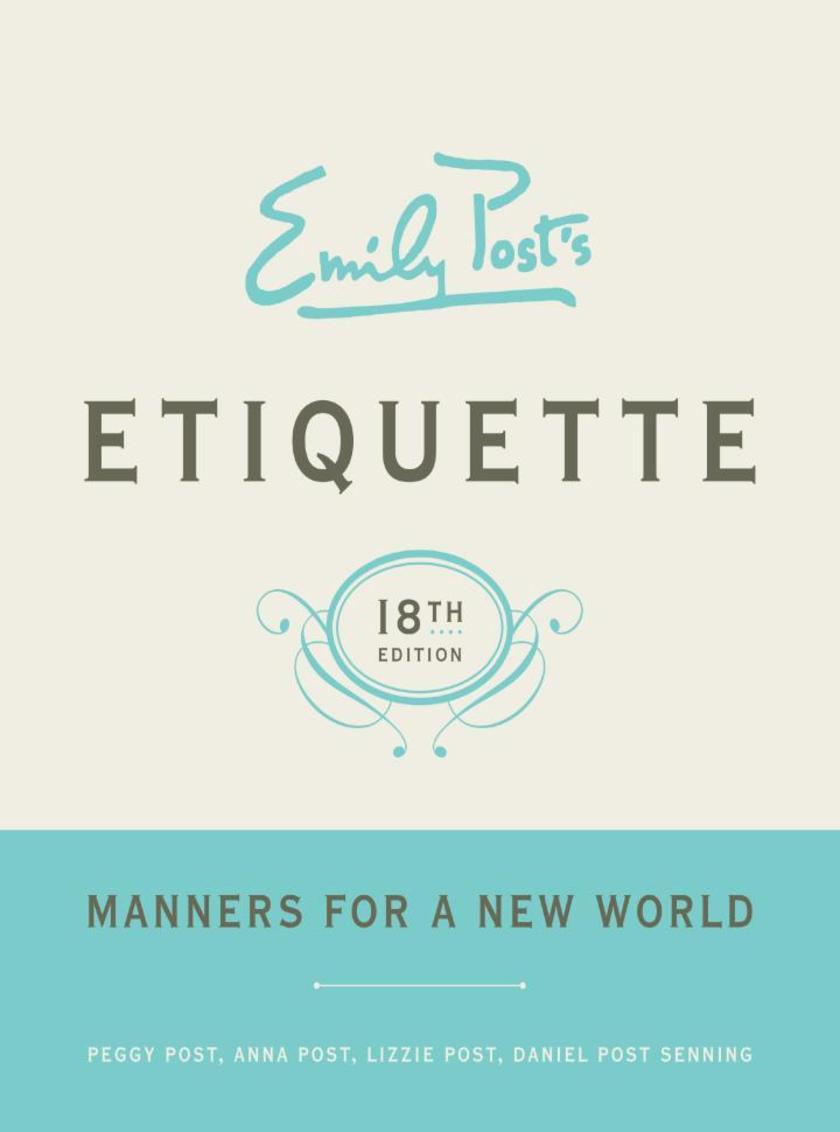
Emily Post's Etiquette, 18
¥221.49
Millions of Readers, Eighteen Editions, One Trusted ResourceFrom social networking to social graces, the name Emily Post has been the definitive source on etiquette for generations of Americans. That tradition continues with the 18th edition of Etiquette, which welcomes a new generation of Posts Anna Post, Lizzie Post, and Daniel Post Senning the great-great grandchildren of Emily Post. Led by Peggy Post, author of the 16th and 17th editions of Etiquette, this team shows how twenty-first-century manners are a combination of kindness, confidence, and awareness. New trends, topics, and societal hot zones include: When is it okay to unfriend someone on FacebookIf I'm in a middle seat on an airplane, do I automatically get both armrestsA business client is sick with a cold am I obligated to shake his handIs it rude for guests to tweet from a weddingDo I have to buy a gift if I attend a destination weddingCan I email a condolence noteShould I cover up my tattoo for a job interviewThe Posts don't stint on classic conundrums, either. Emily Post's Etiquette includes advice on names and titles, dress codes, invitations, table manners, workplace frustrations, and weddings. According to the Posts, though times have changed, the principles of good manners remain constant. Above all, manners are a sensitive awareness of the feelings of others. Being considerate, respectful, and honest is more important than knowing which fork to use. Whether it's a handshake or a fist bump, it's the underlying sincerity and good intentions of the action that matter most.

The Mission Chinese Food Cookbook
¥221.49
From Danny Bowien, chef and cofounder of the tremendously popular Mission Chinese Food restaurants, comes an exuberant cookbook that tells the story of an unconventional idea born in San Francisco that spread cross-country, propelled by wildly inventive recipes that have changed what it means to cook Chinese food in America Mission Chinese Food is not exactly a Chinese restaurant. It began its life as a pop-up: a restaurant nested within a divey Americanized Chinese joint in San Francisco's Mission District. From the beginning, a spirit of resourcefulness and radical inventiveness has infused each and every dish at Mission Chinese Food. Now, hungry diners line up outside both the San Francisco and New York City locations, waiting hours for platters of Sizzling Cumin Lamb, Thrice-Cooked Bacon, fiery Kung Pao Pastrami, and pungent Salt-Cod Fried Rice.The force behind the phenomenon, chef Danny Bowien is, at only thirty-three, the fastest-rising young chef in the United States. Born in Korea and adopted by parents in Oklahoma, he has a broad spectrum of influences. He's a veteran of fine-dining kitchens, sushi bars, an international pesto competition, and a grocery-store burger stand. In 2013 Food & Wine named him one of the country's Best New Chefs and the James Beard Foundation awarded him its illustrious Rising Star Chef Award. In 2011 Bon Appétit named Mission Chinese Food the second-best new restaurant in America, and in 2012 the New York Times hailed the Lower East Side outpost as the Best New Restaurant in New York City. The Mission Chinese Food Cookbook tracks the fascinating, meteoric rise of the restaurant and its chef. Each chapter in the story—from the restaurant's early days to an ill-fated trip to China, to the opening of the first Mission Chinese in New York—unfolds as a conversation between Danny and his collaborators, and is accompanied by detailed recipes for the addictive dishes that have earned the restaurant global praise. Mission Chinese's legions of fans as well as home cooks of all levels will rethink what it means to cook Chinese food, while getting a look into the background and insights of one of the most creative young chefs today.




 购物车
购物车 个人中心
个人中心



